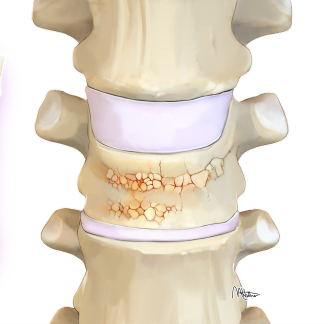Definition/Description
Spinal fractures are different than a broken arm or leg. A fracture or dislocation of a vertebra can cause bone fragments to pinch and damage the spinal nerves or spinal cord. Most spinal fractures occur from car accidents, falls, gunshot, or sports. Injuries can range from relatively mild ligament and muscle strains, to fractures and dislocations of the bony vertebrae, to debilitating spinal cord damage. Depending on how severe your injury is, you may experience pain, difficulty walking, or be unable to move your arms or legs (paralysis). Many fractures heal with conservative treatment; however severe fractures may require surgery to realign the bones.

Symptoms/Characteristics
Symptoms of a spinal fracture vary depending on the severity and location of the injury. They include back or neck pain, numbness, tingling, muscle spasm, weakness, bowel/bladder changes, and paralysis. Paralysis is a loss of movement in the arms or legs and may indicate a spinal cord injury. Not all fractures cause spinal cord injury and rarely is the spinal cord completely severed.
Causes
Fractures of the spine may result from high-energy trauma, such as a:

Treatment
Treatment of a fracture begins with pain management and stabilization to prevent further injury.
Other body injuries (e.g., to the chest) may be present and need treatment as well. Depending on the type of
fracture and its stability, bracing and/or surgery may be necessary.
If you or your child need treatment, your doctor might suggest:
Braces & OrthoticsYour doctor may prescribe a brace for you to wear
after a spinal injury or surgery.
It will immobilize your spine
while you heal and will control pain by restricting your movement.
Spinal fusion surgery Fusion is the joining of two vertebrae with
a bone graft held together with hardware
such as plates, rods, hooks, pedicle screws, or cages.
Physical Therapy for Spinal Fractures
As your body heals from a spinal fracture (or fractures), you may have to go to physical therapy.
This may be part of your overall treatment plan developed by your doctor to help you return to a more
normal life following the fracture.
A physical therapist can work with you to strengthen your spinal muscles so that your spine is more supported and functions better. Spinal fractures change the way your spine functions. The spine is set up so that the stacked vertebrae carry your weight and control your movements; even a minor fracture can make the rest of your spine readjust how it carries your weight. This added stress can strain the muscles that support the spine.
The physical therapist may teach you various exercises and stretches that will focus on your back and core muscles. He or she will work with you to make sure you do them correctly, and you'll probably be given a home exercise plan. Follow this plan exactly because physical therapy is a vital part of your recovery from a spinal fracture.
